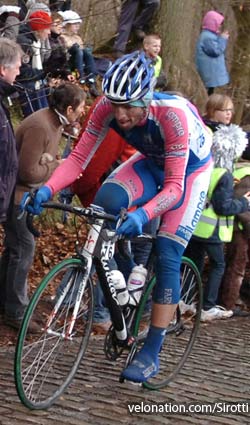 In the wake of recent searches on the homes of Lampre riders Lorenzo Bernucci and Alessandro Petacchi, further questions are being asked of the team after it emerged that an anti-doping investigation is studying the activities of cycling coach Guido Nigrelli, who has often worked with its riders.
In the wake of recent searches on the homes of Lampre riders Lorenzo Bernucci and Alessandro Petacchi, further questions are being asked of the team after it emerged that an anti-doping investigation is studying the activities of cycling coach Guido Nigrelli, who has often worked with its riders.
In all 54 people are reported to be under the scrutiny of investigators, who are studying a possible doping ring based around the small town of Mariana Mantovana. This group includes riders, technicians and managers. The investigation relates to the 2008 and 2009 seasons.
According to La Gazzetta dello Sport, there could also be links between today’s news and the long-running investigation into the Humanplasma clinic in Austria. Former Gerolsteiner rider Bernhard Kohl admitted doping with the help of the Vienna lab, and several former and current Rabobank riders are also believed to have gone there.
Michael Boogerd, Thomas Dekker, Denis Menchov, Joost Posthuma and Pieter Weening were all questioned by investigators last year, and Kohl has implicated Michael Rasmussen in doping activities. Andreas Klöden (currently Team RadioShack) is one of several members of the 2006 T-Mobile Tour de France team which is suspected of receiving transfusions during the race.
Dekker is currently serving a two year ban after testing positive for EPO.
The Italian newspaper said that the latest investigation is focussing on Nigrelli, who also works as a horse trainer. He has long-running links with the teams of Guiseppe Saronni, the current Lampre general manager. He was investigated in Brescia in 2001 for the improper practice of medicine, and was also amongst the 52 suspects pinpointed in the Giro d’Italia raids that same year.
Nothing was found in Petacchi’s house despite a five-hour search. However Bernucci is facing a possible life ban from the sport after several substances were discovered, including a product called Albumine, which can dilute blood and thus lower hematocrit levels. A weight-loss drug called Sibutramine was also reportedly seized. This is the same product he tested positive for in 2007 while part of the T-Mobile team.
If it is determined that he has indeed been doping, a second-offence could permanently remove him from the sport.
While today’s news undoubtedly causes concern for Italian cycling, it continues to keep the pressure on those who are willing to cut corners and to defraud others. Clean riders will applaud such investigations which, along with the biological passport, are greatly increasing the risks of detection.